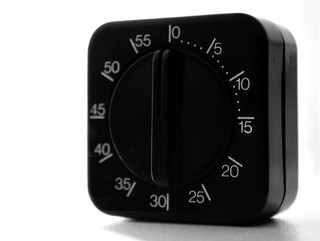 When I was a kid growing up, my mom would set a timer and I practiced until the buzzer went off.
When I was a kid growing up, my mom would set a timer and I practiced until the buzzer went off.
I remember thinking about how I needed to keep making some sort of noise during that time or else I would get in trouble for not really practicing…or what she thought practice was.
To her, practicing was continually making some sort of sound.
Times have certainly changed and since then I’ve learned a lot of things about music practice:
- Making noise is not the same as practicing.
- The amount of time I practice is not as important as what I’m getting done during that time.
Setting a timer was a good way to help establish a practice routine, but it ultimately wasn’t very effective.
Quality vs. Quantity
When you really practice deeply, the amount of time going by doesn’t matter. Your success is not measured in the amount of minutes or hours, but in what gets accomplished.
I know of many people who tell me they practice 14+ hours per week. Then, I hear them play and begin to feel a little sad. I’m not sure what they are doing during that time, but it seems like they are not improving as much as you would expect.
I hate to see someone waste their time by not getting much accomplished when they could be doing something else instead.
Let’s face it, most people don’t enjoy practicing for hours on end unless they feel like they are making major improvements.
Life is too short folks. It’s important to learn how to practice more efficiently and effectively.
Turn Off the Timer
The best way for you to practice is to turn off the timer or turn around the clock completely. Put your back to the clock and focus your mind on things that are much more important like what you are doing.
Instead of counting how many minutes are going by, why not count how many times you are going to repeat something with high precision? Young beginners can get started with this by simply playing their little two-line songs 3 times in a row.
Young children have minds that are not fully developed yet and are not able to work at a high intensity level. Repeating something 3 times in a row is a reasonable expectation for them.
However, those of you reading this right now most likely have fully developed brains. You can handle a much deeper practice with higher repetition.
Music Theory Practice
When learning music theory, don’t just read the book from cover to cover. Make yourself some flashcards and practice them intensely for a set amount of repetitions.
Always grade yourself according to your efforts and not on how much time is going by.
You need to ignore the clock and get quickly into your sweet spot. This is the place where your mind is relaxed and great learning is able to take place.
Better Quality of Practice = More Motivation
When you focus on what you are learning and not how much, progress can happen in as little as a few seconds! I don’t know about you, but when I see results, I am highly motivated to keep doing what’s working.
By using this method, you will see results a lot quicker than if you concentrate on how much time you’re practicing. Keep your mind tuned into mastering small amounts first.
This is the best way to ensure your true musical growth!
If you need more tips on how to practice more effectively and efficiently, please check out my book on ways you can improve your music practice.
photo credit: monkeyc.net via photopin cc
